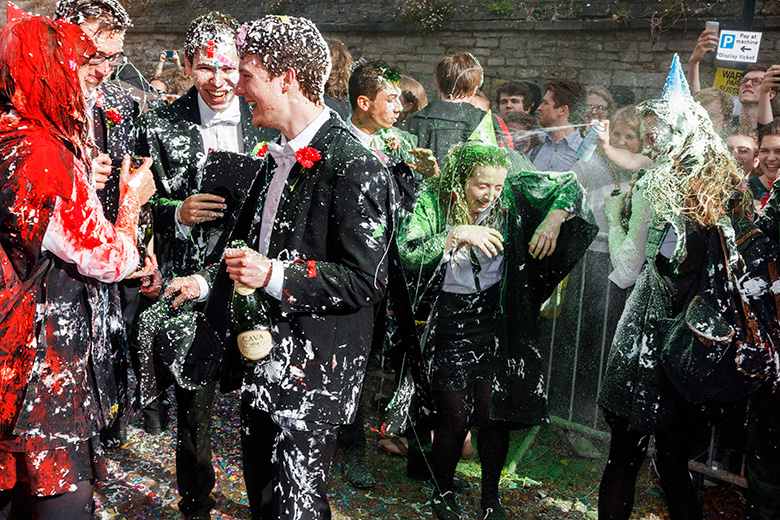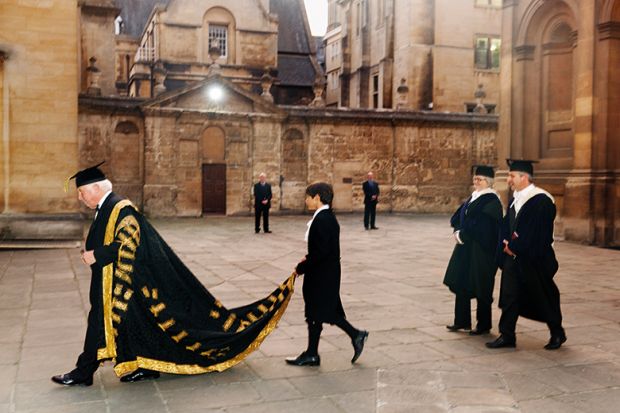The chancellor of the University of Oxford, currently Lord Patten of Barnes, has a page, whose job it is to walk behind him and hold his long gold-trimmed gown at formal events. Some dinners at All Souls College feature walking stick-like implements known as Lord Bathurst’s fingers, which are “used to push and pull the port bottle along the table”.
A new book of photographs of the University of Oxford and its colleges, the product of unprecedented access gained by Martin Parr, one of Britain’s most renowned contemporary photographers, captures those arcane traditions. But the book, titled Oxford, also portrays other sides to Oxford life: sweaty-looking and exuberant scenes from the dance floor of Wadham College’s Queerfest; and the Armenian, Polish and Czech and Slovak societies setting out their stalls to freshers.
Mr Parr’s previous work has covered subjects as diverse as consumerism, Harrow School and the British seaside, with his focus often being on class. Oxford has a crucial role in the British Establishment and in the construction of elites in this country and beyond, yet it remains a hidden world to most.
“That was part of my motivation – to get this access that most people wouldn’t get,” Mr Parr told Times Higher Education. “I’ve looked at all the other books done on Oxford; some of the great photographers have done this [taken Oxford as their subject], and they basically haven’t really gained permission to go much beyond just the facade of the buildings.”
Mr Parr had been “working on a series of pictures of late about the Establishment in Britain, so this seemed to me to be as good a place to go as any”, he said of the book, published by Oxford University Press on 7 September.
The project came about through a conversation with Richard Ovenden, then deputy librarian of the Bodleian Libraries, now holder of the library’s most senior executive post.


Mr Parr said that the “great thing about working with the Bodleian was that I was able to get access to some of this stuff behind the scenes – not everything, but substantially more than most people will get”.
Mr Parr’s time at the institution reaffirmed to him what he already “thought was true: basically they [Oxford students] are being groomed to run the country”. He added that “the whole thing of social etiquette, and meals, the small talk, the dressing up, the uniforms – that’s all part of learning to be part of the Establishment and thus going on to run the country”.
Dinners, balls and garden parties are fruitful subjects in the collection.
Members of The Syndicate, a drinking club at St Edmund Hall, pictured putting on a gruesome-looking dance routine during the Summer Eights rowing tournament, might find Mr Parr’s photo does for them what David Cameron’s Bullingdon Club photo did for him – once they end up running the country.


A rather more formal social occasion pictured is the annual meeting of the Chancellor’s Court of Benefactors, in which only those who have gifted Oxford £1.5 million or more are eligible for membership.
One of the dynamics of the book is the contrast between antiquated traditions and the research carried out in gleaming labs using ultra-modern equipment. Although there is “an inherent contradiction” here, “the two are quite compatible really, that’s the strange thing”, said Mr Parr.
There are other juxtapositions: an All Souls fellow and a cleaner at the college face each other across a spread of pages.
But Mr Parr is known for often satirising his subjects. Is he satirising Oxford here? “The satire…is in the eye of the beholder,” he said. “I just show what goes on; people then have the opportunity to decide what they think.”
Register to continue
Why register?
- Registration is free and only takes a moment
- Once registered, you can read 3 articles a month
- Sign up for our newsletter
Subscribe
Or subscribe for unlimited access to:
- Unlimited access to news, views, insights & reviews
- Digital editions
- Digital access to THE’s university and college rankings analysis
Already registered or a current subscriber? Login




